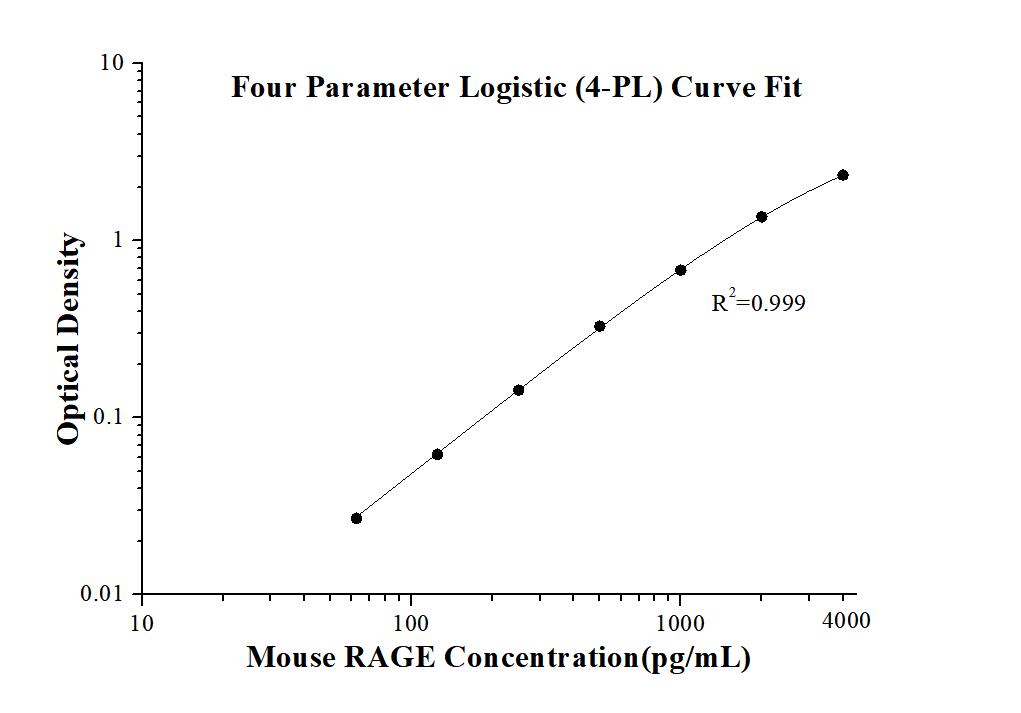Mouse RAGE ELISA Kit
Sensitivity
6.7 pg/mL
Range
62.5-4000 pg/mL
Reactivity
Mouse
Cat no : KE10086
Synonyms
Ager,RAGE,MOK,RAGE 1,RAGE1
Validation Data Gallery
Product Information
KE10086 is a solid phase sandwich Enzyme Linked-Immuno-Sorbent Assay (Sandwich ELISA). The mouse RAGE ELISA kit is to be used to detect and quantify protein levels of endogenous mouse RAGE. The assay recognizes mouse RAGE. An antibody specific for mouse RAGE has been pre-coated onto the microwells. The mouse RAGE protein in samples is captured by the coated antibody after incubation. Following extensive washing, another antibody of biotinylated specific for mouse RAGE is added to detect the captured mouse RAGE protein. For signal development, Streptavidin-HRP is added, followed by Tetramethyl-benzidine (TMB) reagent. Solution containing sulfuric acid is used to stop color development and the color intensity which is proportional to the quantity of bound protein is measurable at 450 nm with the correction wavelength set at 630 nm.
| Product name | Mouse RAGE ELISA Kit |
| Tests | 1 X 96 well plate |
| Sample type | Serum, Plasma, Cell culture supernatants, Tissue lysates |
| Assay type | Sandwich |
| Sensitivity | 6.7 pg/mL |
| Range | 62.5-4000 pg/mL |
| Reactivity | Mouse |
| Tested applications | Sandwich ELISA |
| Gene ID (NCBI) | 11596 |
Recovery
| Sample Type | Average | Range |
|---|---|---|
| Mouse serum | 89% | 71%-110% |
| Cell culture supernatants | 97% | 72%-130% |
| Tissue lysates | 94% | 75%-121% |
IntraAssay
| Sample | n | mean ( pg/mL) | SD | CV% |
|---|---|---|---|---|
| 1 | 20 | 1,632.8 | 37.0 | 2.3 |
| 2 | 20 | 453.1 | 9.7 | 2.1 |
| 3 | 20 | 184.1 | 12.2 | 6.6 |
InterAssay
| Sample | n | mean ( pg/mL) | SD | CV% |
|---|---|---|---|---|
| 1 | 24 | 1,630.4 | 52.3 | 3.2 |
| 2 | 24 | 458.8 | 11.1 | 2.4 |
| 3 | 24 | 193.2 | 13.5 | 7.0 |
Background Information
RAGE (receptor for advanced glycation endproducts), also called AGER, is a transmembrane receptor of the immunoglobulin super family. It mediates interactions of advanced glycosylation end products (AGE) which accumulate in vascular tissue in aging in diabetes. Acts as a mediator of vascular inflammation such as atherosclerosis and a complication of diabetes. AGE/RAGE signal regulates production or expression of TNF-alpha, oxidative stress, and endothelial dysfunction in type 2 diabetes. Interaction with S100A12 on endothelium, mononuclear phagocytes, and lymphocytes triggers cellular activation. Interaction with S100B after myocardial infarction regulates myocyte apoptosis by activating ERK1/2 and p53/TP53 signaling. ABPP-initiated RAGE signaling, especially stimulation of P38 mitogen-activated protein kinase (MAPK), delivers ABPP as a complex with RAGE to the intraneuronal. RAGE has higher expression in lung tissues, in particular in alveolar type I cells, and is lost in idiopathic pulmonary fibrosis (IPF).
Properties
| Storage Instructions | All the reagents are stored at 2-8℃ for 6 months or -20℃ for 12 months. Refer to the protocol for further storage instructions. |
| Synonyms | Ager,RAGE,MOK,RAGE 1,RAGE1 |
